Solar energy is becoming increasingly popular as a clean, renewable, and cost-effective power source. If you’re considering switching to solar energy, investing in solar panel kits is an excellent choice. In this article, I’ll provide valuable information on solar panel kits, their benefits, types, factors to consider before choosing one, the installation process, maintenance tips, and more. By the end, you’ll have a comprehensive understanding of solar panel kits and be equipped to make an informed decision. Let’s dive in!
Introduction
As the demand for sustainable energy grows, solar panel kits have emerged as a practical solution for homeowners and businesses. These kits have all the necessary components to harness the sun’s power and generate electricity. Whether you’re looking to reduce your carbon footprint or save money on energy bills, solar panel kits offer an accessible and efficient way.
What are Solar Panel Kits?
Solar panel kits are pre-packaged systems that include solar panels, mounting hardware, inverters, wiring, and other essential components needed to generate electricity from sunlight. They are designed to simplify the process of going solar by providing all the necessary equipment in a convenient package. These kits are available in various sizes, configurations, and power capacities to suit energy needs.
Solar panel kits are revolutionizing the way we produce and consume energy. Instead of purchasing individual components separately and dealing with the complexities of designing a solar system from scratch, solar panel kits provide a turnkey solution. They offer a hassle-free approach to harnessing the sun’s energy and converting it into usable electricity.
These kits typically include high-quality solar panels made of photovoltaic (PV) cells, which absorb sunlight and convert it into direct current (DC) electricity. The mounting hardware ensures secure installation on rooftops or ground areas with optimal sun exposure. Inverters, an essential component of the kit, convert the DC electricity generated by the solar panels into alternating current (AC) electricity, which can be used to power household appliances and devices.
Benefits of Solar Panel Kits
Solar panel kits offer numerous benefits for individuals, communities, and the environment. Let’s explore some of the key advantages of investing in solar panel kits:
Sustainability
One of the primary benefits of solar panel kits is their contribution to environmental sustainability. Solar panels produce clean electricity by harnessing the sun’s energy without emitting harmful greenhouse gases or pollutants. Traditional electricity generation relies heavily on fossil fuels such as coal, oil, and natural gas, contributing to air pollution and climate change. Using solar power reduces reliance on these finite resources and helps combat the adverse effects of greenhouse gas emissions.
By choosing solar panel kits, you can actively participate in reducing your carbon footprint and preserving the planet for future generations. Solar energy is a renewable and virtually limitless power source, ensuring that you can generate clean electricity for years to come.
Cost Savings
Investing in solar panel kits can lead to significant long-term cost savings. Once installed, solar panels generate free electricity from sunlight, reducing your reliance on the grid and lowering your energy bills. Traditional electricity costs continue to rise, but with solar power, you can hedge against these increasing expenses and gain more control over your energy costs.
Additionally, many governments and utilities offer incentives and tax credits to encourage solar adoption. These financial benefits can further offset the initial investment and shorten the payback period. Depending on your location, you may be eligible for incentives such as net metering, feed-in tariffs, or solar renewable energy certificates (SRECs), which provide financial rewards for the excess energy your system produces and feeds back into the grid.
When considering the financial benefits of solar panel kits, it’s important to evaluate the long-term return on investment (ROI). While the upfront cost may seem substantial, the savings realized over the system’s lifespan can outweigh the initial expenses. Additionally, with technological advancements and economies of scale, solar panel prices have significantly decreased in recent years, making them more affordable.
Energy Independence
With a solar panel kit, you gain energy independence by producing your own electricity. This independence provides a sense of security, especially during power outages or fluctuations in the grid. When the sun is shining, your solar panels will generate electricity, allowing you to power your home or business without relying solely on the grid.
Energy independence also grants you greater control over your energy usage and costs. Instead of being subject to fluctuating utility rates, you can produce your own power and reduce your reliance on fossil fuel-based electricity. This helps stabilize your energy expenses and insulates you from potential price hikes or grid failures.
Solar panel kits with energy storage capabilities allow you to store excess energy in batteries during nighttime or cloudy periods. Coupling solar panels with battery storage can maximize self-consumption and reduce reliance on the grid. This combination offers enhanced energy independence and resilience, ensuring a continuous power supply even in adverse conditions.
Increased Property Value
Installing solar panel kits can also increase the value of your property. Solar-powered homes are highly desirable in the real estate market due to their energy efficiency and reduced operating costs. The presence of a solar panel system demonstrates your commitment to sustainability and can attract potential buyers.
Numerous studies have shown that homes equipped with solar panel systems fetch higher selling prices and tend to sell faster than homes without solar installations. Buyers increasingly seek energy-efficient properties that offer long-term cost savings and environmental benefits. By investing in a solar panel kit, you enjoy the advantages of clean energy and enhance the marketability and value of your property.
Furthermore, solar panel systems typically have warranties that guarantee their performance and durability for a specific period. This assurance provides potential buyers with peace of mind, knowing they are acquiring a reliable and well-maintained energy system.
Types of Solar Panel Kits
When considering solar panel kits, it’s essential to understand the different types available. Here are three common types:
Grid-Tier Solar Power Kits
Grid-tied kits are the most popular option for residential solar installations. These kits allow you to generate electricity from solar panels while remaining connected to the grid. Excess energy produced by the panels can be fed back into the grid, earning you credits or monetary compensation.
Grid-tied solar panel kits are an excellent choice if your primary goal is to reduce your electricity bills and take advantage of available incentives. When your solar panels produce more energy than you consume, the excess is directed into the grid, effectively spinning your electricity meter backward. This process, known as net metering, allows you to accumulate credits with your utility company, which can be utilized during periods when your solar panels are not generating enough power, such as at night.
The grid serves as a virtual energy storage system, providing a constant and reliable power source when your solar panels are not actively generating electricity. Grid-tied kits are cost-effective and straightforward to install, making them a popular choice for residential solar projects.
Off-Grid Solar Power Kits
Off-grid kits are suitable for remote locations or areas with limited or no access to the grid. These kits provide a self-contained power system with a solar battery for energy storage. Off-grid solar panel kits are ideal for cabins, RVs, boats, or any off-grid living situation.
When you choose an off-grid solar panel kit, you become completely independent from the utility grid. The solar panels charge the batteries during the day, and the stored energy is used to power your appliances and devices when the sun is not shining. Off-grid kits often include additional components, such as charge controllers and inverters, to manage the battery charging and convert DC electricity to AC electricity.
When considering an off-grid solar panel kit, it’s important to carefully evaluate your energy needs. Off-grid systems typically require more extensive battery storage to ensure sufficient energy supply during periods of low sunlight. Proper system sizing and design ensure an ample power reserve to meet your daily electricity requirements.
Hybrid Solar Panel Kits
Hybrid kits combine the benefits of grid-tied and off-grid systems. They allow you to store excess energy in batteries for later use, providing backup power during grid outages. Hybrid kits are reliable for those seeking energy independence and grid resilience.
With a hybrid solar panel kit, you can still benefit from the advantages of net metering and feed excess energy back into the grid. Simultaneously, the kit’s energy storage component allows you to store surplus energy during nighttime or during power outages.
Hybrid systems are particularly suitable for areas with unreliable or unstable grid connections. They provide a seamless transition between grid-connected and off-grid modes, ensuring uninterrupted power supply and peace of mind.
When choosing the type of solar panel kit that best suits your needs, consider factors such as your location, energy consumption patterns, grid reliability, and long-term energy goals. Consulting with a reputable solar installer can help you determine the most appropriate solution for your specific circumstances.
Recommended Products
ECO-WORTHY Solar Panel Kit 25W 12V
Introducing the “ECO-WORTHY Solar Panel Kit 25W 12V,” an essential off-grid solar kit expertly designed to charge and maintain 12V batteries. The solar panel kit is suitable for various battery types, including sealed lead-acid, lithium, LiFePO4, Gel, Flooded, and AGM batteries.
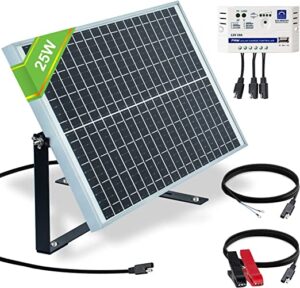
In optimal sunlight, this 25W solar panel kit can generate up to 100Wh of electricity, continuing to perform even during cloudy days. This ensures your battery remains consistently topped off, entering maintenance mode once fully charged.
The panel boasts robust durability, featuring a low-iron tempered glass surface and a corrosion-resistant aluminum frame. These materials offer excellent protection against weathering and wear, enduring wind pressures up to 2400 Pa and a snow load of 5400 Pa. The waterproof quality of the panel makes it ideal for outdoor use or during winter conditions. The monocrystalline cells embedded in the panel ensure high conversion efficiency.
To protect the battery, the kit includes a 10A PWM charge controller. This allows expansion by wiring more 12V 25W panels in parallel while safeguarding the battery from overcharging, over-discharging, over-voltage, short circuits, and reverse current issues. The controller has two indicators for easy monitoring of charging and discharging statuses and a USB 5V/2A output port.
For optimal sunlight reception, the solar mounting brackets allow 360-degree adjustment of the mounting angle. Pre-drilled holes on the back of the panel facilitate quick and secure installation. The connection cable comes with an easy-to-connect SAE connector. This makes the ECO-WORTHY Solar Panel Kit 25W 12V an ideal choice for varied applications such as boats, tractors, trailers, trucks, RVs, generators, sheds, electric fences, and pumps. Check Amazon’s great prices here.
Topsolar Solar Panel Kit 20W 12V
Introducing the “Topsolar Solar Panel Kit 20W 12V,” a perfect solution for your off-grid 12V battery charging needs. This versatile kit is designed for a myriad of DC applications. It is particularly effective in maintaining 12V batteries in cars, RVs, cabins, boats, marine environments, battery-operated gates, and for backup and remote power use.
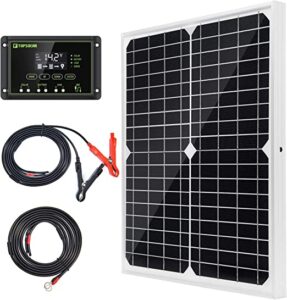
This solar panel kit package includes a 20W solar panel, a 12V/24V solar charger regulator controller, two 6.5ft cables with alligator clips, and an O-ring terminal for convenient battery charging connections. These components make fixing and installation a breeze.
The inclusion of the 10A solar charger controller is a significant advantage. It prevents the battery from overcharging, over-voltage, discharging, and short-circuit issues. It also offers reversed polarity protection, ensuring your battery is thoroughly safeguarded.
Despite its power, the Topsolar Solar Panel Kit 20W 12V is compact and lightweight, making it easy to carry for camping or other outdoor activities. The pre-drilled holes on the back of the panels facilitate quick mounting and secure fastening.
Strength and durability are guaranteed with this solar panel kit. The panel is constructed with robust tempered glass and an aluminum frame, ensuring longevity and reliable performance under various weather conditions. Experience the future of sustainable and portable energy with the Topsolar Solar Panel Kit 20W 12V. Check out popular Amazon prices here.
SOLPERK Solar Panel Kit 30W 12V
Presenting the “SOLPERK Solar Panel Kit 30W 12V,” an embodiment of high-quality solar technology. It boasts a high conversion rate thanks to its 30W monocrystalline A+ solar cell, which offers an impressive cell efficiency of 21%-30%. This solar panel is designed to charge and maintain a variety of 12V rechargeable batteries, including LiFePO₄, Lithium Ion, AGM, SLA, GEL, EFB, and MF batteries. It is perfect for keeping batteries charged for various equipment such as trailers, tractors, trucks, boats, motorcycles, RVs, cars, lawnmowers, water pumps, gate openers, electric fences, and more.
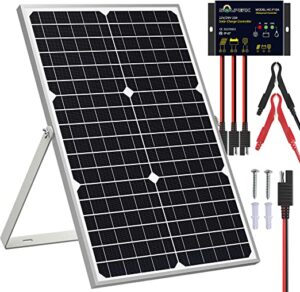
SOLPERK’s solar panel is engineered to last, with its low-iron tempered glass surface and corrosion-resistant aluminum frame ensuring it is 100% waterproof and rustproof. The robust construction of the solar panel allows it to weather all conditions, be it sandstorms, strong winds, thunderstorms, blizzards, or hail. It can withstand wind pressure up to 2400Pa and a snow load of 5400Pa, providing an extended lifespan of up to 25 years.
Included in the kit is an IP65 waterproof smart charge controller. This upgraded 10A controller has a charging efficiency of 20%-30% higher than other controllers on the market. Its intelligent three-stage charging design effectively safeguards the battery from overcharging. With three indicator lights on the controller, you can easily track the battery’s charging status.
The SOLPERK Solar Panel Kit also shines in terms of installation and adjustability. It comes equipped with a 360-degree angle-adjustable mounting bracket, ensuring the solar panel always faces the sun at the optimal angle. Pre-drilled mounting holes and included screws make mounting the bracket on the solar panel a breeze. All cable connections are plug-and-play for your convenience.
Choose the SOLPERK Solar Panel Kit 30W 12V for efficient and reliable solar charging solutions. Check Amazon’s prices here. Check out on Amazon here.
Factors to Consider Before Choosing a Solar Panel Kit
Before investing in a solar panel kit, consider the following factors:
Energy Requirements
Determine your average daily energy consumption to understand the size and capacity of the solar panel kit you’ll need. Consider the number of appliances, lights, and devices you use regularly. A reputable solar installer can help you assess your energy needs accurately.
To calculate your energy requirements, review your monthly utility bills to determine the total kilowatt-hours (kWh) consumed. Divide this value by the number of days in the billing period to estimate your average daily kWh consumption. This figure will serve as a baseline for determining the size of the solar panel kit that can meet your energy needs.
It’s important to consider future energy demands as well. If you anticipate changes in your energy consumption, such as adding new appliances or expanding your living space, factor these into your calculations. A slightly oversized solar panel kit can accommodate future growth and ensure you have sufficient energy production capabilities.
Available Space
Evaluate the available space for solar panel installation, such as your roof or a dedicated ground area. The size and number of panels you can install depend on the available space and its orientation towards the sun. Ideally, the panels should receive ample sunlight throughout the day for optimal performance.
Roof-mounted installations are the most common choice for residential solar panel systems. Assess your roof’s condition, slope, and shading patterns to determine its suitability for solar panel installation. South-facing roofs typically receive the most sunlight in the Northern Hemisphere, providing the best conditions for solar energy generation. However, east-facing and west-facing roofs can still be viable options depending on the available space and local climate.
If you don’t have suitable roof space or prefer ground-mounted installations, ensure that you have a dedicated area with unobstructed sunlight. Ground-mounted solar panel systems offer more flexibility in system size and orientation, allowing optimal placement to maximize energy production.
In some cases, shading from nearby trees, buildings, or structures can impact solar panel performance. Consider the potential shading issues and explore mitigation strategies such as tree trimming or adjusting panel placement to optimize sunlight exposure.
Budget & Financing Options
Set a budget for your solar panel kit investment. Consider the upfront costs, ongoing maintenance expenses, and potential financing options. Solar panel kit prices vary depending on factors such as system size, brand, quality, and additional features.
While solar panel kits may require a significant initial investment, it’s essential to consider the long-term financial benefits and potential return on investment. By generating your own electricity, you can significantly reduce your energy bills over time, effectively offsetting the upfront costs.
Numerous financing options are available to help make solar panel kits more affordable. Some common options include solar loans, leases, power purchase agreements (PPAs), and property-assessed clean energy (PACE) programs. These financing arrangements allow you to pay for your solar panel kit over time or through a fixed monthly payment, minimizing the upfront financial burden.
Additionally, various federal, state, and local incentives and tax credits are often available to promote solar adoption. These incentives can significantly reduce the overall cost of your solar panel kit. Research the available programs and consult with a solar professional to understand the financial incentives applicable to your region.
Quality and Warranty
Ensure that your solar panel kit is of high quality and has a reliable warranty. Research reputable brands and check customer reviews to gauge their performance and durability. A well-built kit with a solid warranty will provide peace of mind and maximize the return on your investment.
Solar panels typically come with a manufacturer’s warranty that covers defects, performance issues, and equipment failure for a specific period. The standard warranty for solar panels ranges from 10 to 25 years. Pay attention to the warranty terms and coverage details, including degradation rates and replacement policies.
In addition to the manufacturer’s warranty, consider the solar installer’s or retailer’s reputation and experience. A reputable installer can provide expert advice, proper installation, and ongoing support to ensure your solar panel kit operates optimally throughout its lifespan.
How to Install a Solar Panel Kit
Solar panel kit installation typically involves the following steps:
Site Assessment
An expert installer will assess your property to determine the best location for solar panel placement. They will evaluate the orientation, shading, and structural integrity of your roof or ground area to ensure optimal energy generation.
During the site assessment, the installer will also consider electrical requirements, such as the proximity to your electrical panel and the necessary wiring connections. They may conduct a shading analysis using advanced tools to identify potential obstructions that could affect the performance of your solar panel system.
By conducting a thorough site assessment, the installer can design a solar panel system that maximizes energy production and addresses any site-specific challenges.
Mounting & Wiring
Once the site assessment is complete, the installer will mount the solar panels. The panels are securely attached to the roof or ground mounting system using specialized mounting hardware. The installer will ensure proper alignment and spacing between panels for optimal sunlight exposure.
Wiring plays a crucial role in connecting the solar panels to the rest of the system components. The installer will carefully route and connect the DC wiring from the panels to the inverter location, typically near your main electrical panel.
To comply with electrical codes and ensure safety, the installer will properly size and install conduits, cables, and junction boxes. They will follow best practices for wire management, minimizing potential voltage drops and electrical losses.
Inverter Installation
Depending on the type of solar panel kit you choose, you may have a string inverter or microinverters. String inverters are commonly used in grid-tied systems, where multiple solar panels are connected in series. Microinverters, on the other hand, are installed on each panel in systems requiring more flexibility or suffering from shading issues.
The installer will carefully mount and wire the inverter, ensuring proper grounding and adherence to electrical codes and safety standards. They will also configure the inverter settings to match your specific system requirements.
Connection to the Grid
If you opt for a grid-tied solar panel kit, the installer will connect your system to the electrical grid. This allows you to draw electricity from the grid when your solar panels aren’t producing enough power and feed excess energy back into the grid when you generate more than you consume.
The connection to the grid involves coordination with your local utility company and compliance with interconnection requirements. The installer will handle the necessary paperwork, permits, and inspections to ensure seamless integration of your solar panel system with the grid.
By connecting to the grid, you can benefit from net metering programs that credit you for the excess electricity you feed back into the grid. These credits can offset your electricity bills when your solar panels aren’t generating enough power, such as during nighttime or periods of high energy consumption.
System Commissioning
Once the installation is complete, the solar panel system is thoroughly tested to ensure proper functioning. The installer will perform a series of tests to measure the system’s electrical output, confirm proper wiring connections, and verify the performance of the inverter.
During the commissioning process, the installer will guide you on monitoring the system’s performance and explain any maintenance requirements. They may provide access to monitoring software or tools that allow you to track your solar panel system’s energy production and overall performance.
It’s important to note that solar panel kit installation should be performed by qualified professionals with experience in solar installation. This ensures compliance with local regulations, electrical codes, and safety standards.
Maintenance and Care of Solar Panel Kits
Proper maintenance is vital to ensure your solar panel kit’s longevity and optimal performance. By following a few simple maintenance practices, you can maximize your system’s energy production and prolong its lifespan. Here are a few maintenance tips:
- Regular Cleaning: Periodically clean the solar panels to remove dust, debris, or bird droppings that can hinder their efficiency. Use a soft brush or a gentle stream of water to clean the surface. Avoid using abrasive materials or harsh chemicals that can scratch or damage the panels.
- Inspections: Conduct visual inspections of the panels for any signs of damage, such as cracks or loose wiring. Promptly address any issues by contacting a professional solar installer. They can assess the situation and provide the necessary repairs or replacements.
- Monitoring Performance: Keep an eye on your solar panel system’s performance through monitoring tools or software provided by the manufacturer. Monitor energy production levels and check for any deviations from normal operation. If you notice a significant drop in energy generation or suspect a system malfunction, contact a solar professional for assistance.
- Professional Maintenance: Schedule periodic maintenance visits by qualified technicians to ensure the system operates optimally. These professionals have the expertise to conduct in-depth inspections, clean hard-to-reach areas, and perform necessary repairs or adjustments. Regular maintenance visits can help identify and address potential issues before they escalate.
- Safety Precautions: If you notice any abnormalities or suspect a fault in the system, always prioritize safety and contact a professional. Working with electricity requires expertise and caution. Avoid attempting any repairs or maintenance activities you’re not qualified to perform.
Remember that while solar panel kits are designed to be durable and low-maintenance, regular care and attention can go a long way in ensuring your solar panel system’s long-term performance and reliability.
Conclusion
Solar panel kits offer an accessible and efficient way to embrace clean and sustainable energy. Investing in a solar panel kit can reduce your carbon footprint, save money on energy bills, and enjoy energy independence. When selecting a solar panel kit, consider your energy requirements, available space – you may benefit from flexible solar panels -, budget, and quality. Proper installation, maintenance, and care are crucial to maximizing the performance and longevity of your solar panel system. Take advantage of this renewable energy solution and start harnessing the sun’s power today!
FAQs
Are solar panel kits suitable for all types of properties?
Solar panel kits can be installed on various properties, including residential homes, commercial buildings, and even mobile homes. However, it’s essential to assess your property’s solar potential, available space, and structural considerations to determine the feasibility of a solar panel installation.
Factors such as roof orientation, shading, and structural integrity play a crucial role in the efficiency and effectiveness of a solar panel system. Consulting with a reputable solar installer can help evaluate your property and provide customized solutions that align with your specific needs.
How long does it take to recoup the investment in a solar panel kit?
The payback period for a solar panel kit varies depending on factors such as energy consumption, local electricity rates, available incentives, and the cost of the system. On average, homeowners can recoup their investment within 5 to 10 years through energy savings.
It’s important to consider the long-term financial benefits of solar panel kits. While the upfront cost may seem significant, the savings realized over the system’s lifespan can outweigh the initial expenses. Additionally, the payback period can be further reduced with available incentives and financing options.
Can I install a solar panel kit myself?
While it’s technically possible to install a solar panel kit yourself, hiring a professional installer is recommended. Solar panel installation involves electrical work and structural considerations that require expertise and knowledge to ensure safety and optimal performance.
Qualified solar installers have the experience, skills, and tools to handle the complexities of solar panel installation. They can properly assess your property, design an efficient system, obtain necessary permits, and ensure compliance with local regulations. Hiring a professional installer ensures a seamless installation process and minimizes the risk of errors or safety hazards.
Do solar panel kits work in cloudy or cold climates?
Solar panels can still generate electricity in cloudy or cold climates, although their efficiency may be slightly reduced compared to sunny regions. Technology advancements have made solar panels more effective in capturing sunlight, allowing them to generate power even in less ideal weather conditions.
Solar panels rely on sunlight rather than temperature, meaning they can still produce electricity even on cold days. However, it’s important to note that solar panel performance may vary depending on the intensity and duration of sunlight exposure. Consult with a solar professional to assess the solar potential in your specific climate and determine the expected energy production.
Can I expand my solar panel system in the future?
Yes, most solar panel kits are expandable. If you plan to increase your energy production in the future, you can add more solar panels to your existing system. Consult with a solar professional to ensure proper system design and compatibility when expanding your solar panel setup.
Expanding your solar panel system allows you to increase your energy production capacity and potentially further reduce your reliance on the grid. Whether you’re adding panels to accommodate increased energy consumption or taking advantage of additional roof or ground space, consult a professional to ensure seamless integration of new components with your existing system.
Remember, investing in a solar panel kit is a smart financial decision and a step towards a more sustainable future. Embrace the sun’s power and enjoy the benefits of clean, renewable energy for years to come!

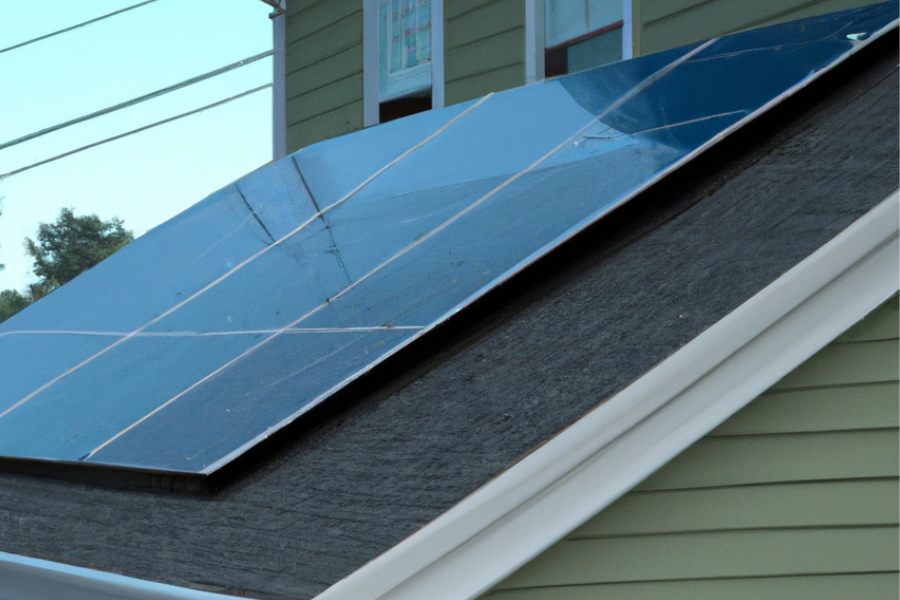
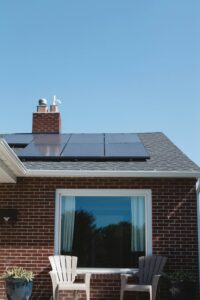
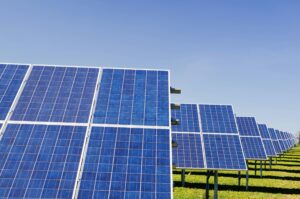

Pingback: How Do Solar Panels Work: A Guide for Curious Minds
Pingback: Most Efficient Solar Panels: A Comprehensive Guide - Eco Life Wise
Pingback: Composting Worms: The Unsung Heroes of Your Garden *
Pingback: Off Grid Trailers: The Ultimate Guide - Eco Life Wise
Pingback: Solar Farms: Harnessing the Power of the Sun - Eco Life Wise
Pingback: Flexible Solar Panels: Eco Friendliness With a Bend & a Twist!
Pingback: The Solar Water Fountain: Top 5 Picks For Your Outdoor Space
Pingback: Bokashi Composting: Green Thumbs, Unite!
Pingback: Self Sustaining Homes: A Definitive Guide to the Exciting Future
Pingback: Off Grid Solar System: A Step Toward Self Sufficiency
Pingback: The Solar Battery: Ensuring A Future of Sustainable Energy
Pingback: Facts About Solar Energy: Harnessing the Sun's Power
Pingback: Pros and Cons of Solar Energy: Weighing it Up | Eco Life Wise
Pingback: Solar 5e: Harnessing the Sun's Energy Like Never Before
Pingback: 7 Fun Facts About Wind Energy That Will Blow You Away | Eco Life Wise
Pingback: Off Grid Wind Turbine: Harness the Power of Wind | Eco Life Wise
Pingback: Solar Powered Generator: The Future of Sustainable Energy
Pingback: Portable Solar Panels: An Anywhere, Anytime Solution
Pingback: Solar Water Pump: Sustainable Water Solutions | Eco Life Wise
Pingback: Pros and Cons of Renewable Energy | Eco Life Wise
Pingback: Energy Efficient Homes: Your Ultimate Guide to Greener Living | Eco Life Wise
Pingback: Climate Change Reality: The Unvarnished Truth We Can't Ignore | Eco Life Wise
Pingback: Examples of Sustainability: How They Shape Our World | Eco Life Wise
Pingback: Goodwill Recycling: Transforming Lives and Our Planet
Pingback: Sustainable Development Goals: Steps to Saving the World
Pingback: Advantages of Renewable Energy: Embracing a Cleaner Future | Eco Life Wise
Pingback: Examples of Natural Resources: Unearthing Earth's Treasures | Eco Life Wise
Pingback: Charge Your Electric Car With Solar Panels: The Ultimate Guide to Green Energy! | Eco Life Wise
Pingback: Building Off the Grid: A Guide to a Self-Sustained Lifestyle
Pingback: Self Sustainable Homes: 7 Practical Reasons Why You Need One Today! | Eco Life Wise
Pingback: Net Zero Revolution: North Carolina Leading the Way | Eco Life Wise
Pingback: Solar Energy Pros and Cons: 8 Considerations | Eco Life Wise
Pingback: Benefits of Renewable Energy: The Future is Bright (and Windy!) | Eco Life Wise
Pingback: What Is A Green Building? | Eco Life Wise
Pingback: Commercial Solar Panels: Exploring the Lifespan | Eco Life Wise
Pingback: How Do Solar Panels Work? New Solar Panels 101 | Eco Life Wise
Pingback: Renewable Energy Sources: 10 Ways They Help Reduce Greenhouse Emissions | Eco Life Wise
Pingback: Off Grid Air Conditioner: A Green Solution to Beat the Heat
Pingback: How Does Self-Sustaining Architecture Differ From Traditional Architecture? 7 Big Ways | Eco Life Wise
Pingback: Solar Farms: Solar Works NJ Proven Number 1 at Empowering the Future | Eco Life Wise
Pingback: Why Are Solar Panels Considered A Green Energy Source? | Eco Life Wise
Pingback: Solar Development on Brownfields and Landfills: 8 Factors That Unlock Value | Eco Life Wise
Pingback: How Do Off-Grid Communities Source Water And Power? | Eco Life Wise
Pingback: How Does Renewable Energy Contribute To Reducing Greenhouse Gas Emissions? 10 Facts | Eco Life Wise
Pingback: How Much Does It Typically Cost To Build A Self-sustaining Home? | Eco Life Wise
Pingback: Salangae Solar Garden Lights Review | Eco Life Wise
Pingback: Hiluckey Solar Charger Review: 10 Exciting Innovations | Eco Life Wise
Pingback: Allto Solar Remote Meter Review: 10 Amazing Facts | Eco Life Wise
Pingback: Portable Power Station Review: 10 Awesome Tips | Eco Life Wise
Pingback: Anker Solix PS30 Solar Panel Review | Eco Life Wise
Pingback: Electric Circuit Motor Kit Review: 10 Handy Tips | Eco Life Wise
Pingback: WYWNA Solar Street Light Review: 10 Amazing Facts | Eco Life Wise
Pingback: Victron Energy BlueSolar MPPT 75V 15 Amp 12/24-Volt Solar Charge Controller Review | Eco Life Wise
Pingback: Victron Energy BlueSolar MPPT 100V 30 amp 12/24-Volt Solar Charge Controller Review | Eco Life Wise
Pingback: How to Save on Electric Bill: 10 Top Tips to Slash It! | Eco Life Wise